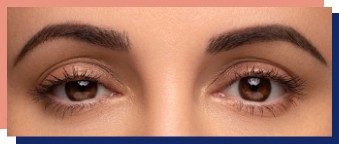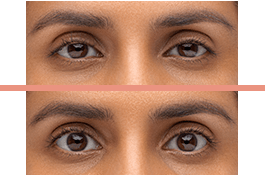Why do my eyelids look low?
If your eyes look “tired” or “sleepy,” you may have a condition called acquired blepharoptosis (also known as acquired ptosis or low-lying lids).
Acquired ptosis is a common medical condition that:
- Can develop later in life
- Affects adults of all ages, but occurs more often with increased age
- Usually occurs when the muscles in the eyelid stretch and weaken, causing the upper eyelid to droop
- May be caused by other issues, such as cataract surgery, contact lens wear, or an underlying medical condition. It could also be a sign of a more serious medical condition.

Upneeq®: the only FDA-approved prescription eyedrop for acquired ptosis
Now at Cibolo Creek Dermatology Group
 Upneeq is the only FDA-approved prescription eyedrop for acquired ptosis (low-lying lids) that lifts your upper eyelids to open your eyes
Upneeq is the only FDA-approved prescription eyedrop for acquired ptosis (low-lying lids) that lifts your upper eyelids to open your eyes
Most patients in clinical trials had a lift in their eyelids in as little as 2 hours. In one study, some patients saw a lift in their eyelids as fast as 5 minutes after the first dose. Upneeq can significantly improves upper field of vision. In clinical trials, Upneeq helped patients with acquired ptosis see more—on the first day of treatment!
Call us today at (830) 971-5256 for more information about acquired ptosis or request an appointment online.

Do you have low-lying lids?
Take a quick interactive quiz about your eyelids. Clicking the button will open a new browser window.
Millions of people who have acquired ptosis may not even be aware of it
- Millions of people over the age of 40 may have acquired ptosis
- But only 15% have been diagnosed, and even fewer have received any treatment*
Acquired ptosis can lead to vision impairment
Low-lying eyelid(s) can affect eyesight by not only blocking your vision, but also by reducing field of vision, which may interfere with day-to-day functions such as:
- Reading
- Driving
- Computer use
- Looking up without the need to tilt your head back
